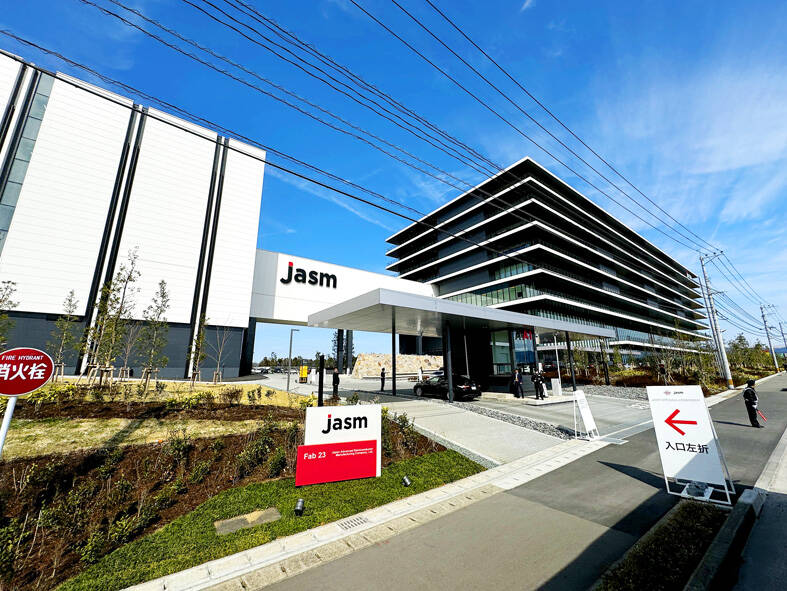Approved outbound investments by the Department of Investment Review, excluding those to China, reached a record US$24.19 billion in the first half of this year, surging 169.64 percent from a year earlier, the Ministry of Economic Affairs (MOEA) said on Monday.
That was mainly driven by Taiwan Semiconductor Manufacturing Co’s (台積電) investments of US$5.26 billion in its Japanese subsidiary and US$5 billion in its US unit, as well as WT Microelectronics Co’s (文曄科技) investment of US$3.98 billion to acquire Canadian electronic components distributor Future Electronics Inc, the ministry said in a statement.
The investment amount in the first half outpaced the US$23.58 billion approved for the whole of last year, it said.

Photo: CNA
As companies continue to diversify their supply chains and reduce their dependence on China, approved investments to countries included in the government’s New Southbound Policy surged 113.23 percent to US$4.53 billion in the first six months, the ministry said.
That was led by Hon Hai Precision Industry Co’s (鴻海精密) investments of US$2.49 billion in Foxconn Singapore Pte Ltd and NT$15 billion (US$459.77 million) in Foxconn EV Singapore Holdings Pte Ltd, along with other local firms’ increased investments in Vietnam and Thailand, the ministry added.
The New Southbound Policy, introduced in 2016, is designed to enhance trade and exchanges between Taiwan and 18 nations in Southeast Asia, South Asia and Oceania.
In comparison, outbound investments to China fell 19.03 percent year-on-year to US$1.55 billion during the first six months, the ministry said.
Meanwhile, foreign direct investment (FDI) approved by the department totaled US$3.25 billion in the first half, down 49.3 percent from the same period last year and marking the lowest in six years, the ministry said, attributing it in part to a high comparison base the previous year.
FDI measures the investment activities of foreign firms, including the incorporation of a subsidiary or joint venture, a cash injection into a local unit, or mergers or acquisitions of domestic companies.
A high comparison base last year was also a factor behind the 92.3 percent annual decline in approved investments from New Southbound Policy countries to US$172.63 million during the first six months, the ministry said.
That is because in the first half of last year Singapore-based DBS Bank Ltd (星展銀行) gained approval to inject NT$52 billion in new capital into DBS Bank Taiwan (星展台灣), and Raiden APAC Pte Ltd, also based in Singapore, secured permission to inject capital of NT$3.19 billion into Taiwan Google Infrastructure Co (台灣科高基礎設施), it said.
The FDI figure excludes investments from China. The department approved US$16.37 million in investments by Chinese firms in the first six months, down 1.74 percent from a year earlier, the ministry said.

MARKET LEADERSHIP: Investors are flocking to Nvidia, drawn by the company’s long-term fundamntals, dominant position in the AI sector, and pricing and margin power Two years after Nvidia Corp made history by becoming the first chipmaker to achieve a US$1 trillion market capitalization, an even more remarkable milestone is within its grasp: becoming the first company to reach US$4 trillion. After the emergence of China’s DeepSeek (深度求索) sent the stock plunging earlier this year and stoked concerns that outlays on artificial intelligence (AI) infrastructure were set to slow, Nvidia shares have rallied back to a record. The company’s biggest customers remain full steam ahead on spending, much of which is flowing to its computing systems. Microsoft Corp, Meta Platforms Inc, Amazon.com Inc and Alphabet Inc are

Luxury fashion powerhouse Prada SpA has acknowledged the ancient Indian roots of its new sandal design after the debut of the open-toe footwear sparked a furor among Indian artisans and politicians thousands of miles from the catwalk in Italy. Images from Prada’s fashion show in Milan last weekend showed models wearing leather sandals with a braided design that resembled handmade Kolhapuri slippers with designs dating back to the 12th century. A wave of criticism in the media and from lawmakers followed over the Italian brand’s lack of public acknowledgement of the Indian sandal design, which is named after a city in the

The US overtaking China as Taiwan’s top export destination could boost industrial development and wage growth, given the US is a high-income economy, an economist said yesterday. However, Taiwan still needs to diversify its export markets due to the unpredictability of US President Donald Trump’s administration, said Chiou Jiunn-rong (邱俊榮), an economics professor at National Central University. Taiwan’s exports soared to a record US$51.74 billion last month, driven by strong demand for artificial intelligence (AI) products and continued orders, with information and communication technology (ICT) and audio/video products leading all sectors. The US reclaimed its position as Taiwan’s top export market, accounting for

INVESTOR RESILIENCE? An analyst said that despite near-term pressures, foreign investors tend to view NT dollar strength as a positive signal for valuation multiples Morgan Stanley has flagged a potential 10 percent revenue decline for Taiwan’s tech hardware sector this year, as a sharp appreciation of the New Taiwan dollar begins to dent the earnings power of major exporters. In what appears to be the first such warning from a major foreign brokerage, the US investment bank said the currency’s strength — fueled by foreign capital inflows and expectations of US interest rate cuts — is compressing profit margins for manufacturers with heavy exposure to US dollar-denominated revenues. The local currency has surged about 10 percent against the greenback over the past quarter and yesterday breached